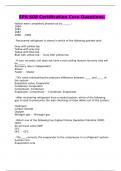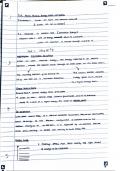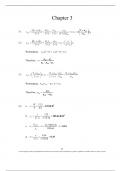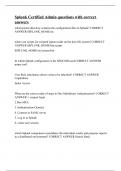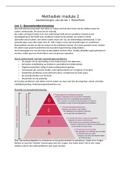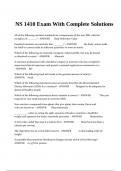Research Methodology
Table of content
Lecture 1 Introduction ............................................................................................................................ 2
Lecture 2 Formulating hypotheses and types of relationships ............................................................... 3
Lecture 3 Measurement .......................................................................................................................... 6
Lecture 4 Qualitative Research ............................................................................................................... 9
Lecture 5 Sampling Designs (1) ............................................................................................................. 10
Lecture 6 Sampling Designs (2) ............................................................................................................. 13
Lecture 7 Survey Research (1) ............................................................................................................... 14
Lecture 8 Survey Research (2) ............................................................................................................... 17
Lecture 9 Experiment design (1) ........................................................................................................... 19
Lecture 10 Experimental design (2) ...................................................................................................... 22
Lecture 11 Evaluation Research ............................................................................................................ 23
Lecture 12 Existing Data ........................................................................................................................ 25
, Lecture 1 Introduction
The aim of science is to
Process Product
The methods through which scientific knowledge is created, A logical structure of knowledge that tells us something about
tested, and refined (for example, this course) how or why something is (for example, laws and theories)
The aim is to produce knowledge. First, we must describe
objects and events before we can understand the relationships
among them
You may be a consumer of research in several positions: a student reading research reports and
journal articles. In addition to being consumers, we are gathers and producers of research evidence.
There are various approaches:
1. Survey
2. Experiments
3. Field research
4. Available data
Empirical generalizations are when
terms are derived from observations
or hypotheses when they have been
proposed but not tested. To the extent
that the propositions have been
repeatedly verified and are accepted,
they may have become known as
scientific laws.
Qualitative research Quantitative research
• Observation/ available data leads to a theory developed • Testing theory/hypotheses through deduction
by induction • Possible adjust or even refute theory through induction
• Processes, events, experiences, perceptions, beliefs • Relationships and effects
• Emphasis on inductive process • Emphasis on deductive process
• No hypotheses, but possibly expectations • Testable hypotheses derived from theory or logic
• Theory development and adaptation • Testing hypotheses
• Interviews, field research, available data • Questionnaires (quantifiable), experiments, available data
Scientific research questions are those that are to be answered by means of empirical research.
Scientific asks about how and why certain phenomena occur, while not scientific asks about what
would be good or desirable
↪ Scientific research questions: describe a phenomenon, explain of why it occurs,
explore/investigate
To formulate a scientific question we need to know:
• What is interesting?
• What is a concept? → a general description of a phenomenon (weight, social cohesion)
o If a concepts has been developed for scientific purposes, we call it a construct
• What is scientific knowledge?
, Hypothesis is a supposition or conjecture put forth to account for known facts → In science it is a
tentative answer to a research question (phrased as a statement, not ambiguous, testable)
• An expected but unconfirmed relationship between variables (provides a prediction)
• We need to know what a variable is (characteristics that can vary, that are observable in the
real world)
o Categorical variables: the values they can
take are categories (single, married, etc)
o Continuous variables: the values can be
taken in numbers (weight, IQ)
• The purpose of a variable in a study
o Independent variables: is assumed to
influence the dependent variable, it is the
cause, it is the predictor, X
o Dependent variables: than one seeks to
explain, its variation is thought to be
influenced by de independent variables,
is the outcome/effect, Y
Lecture 2 Formulating hypotheses and types of relationships
To formulate hypotheses, we need to identify: variables of interest, the objective of the research
(descriptive/explanatory), measurement of the involved variable, the purpose of a variable in a study,
form of the relationship
• Descriptive hypotheses: for single variable
o To formulate this hypothesis we must state expectations about the value taken by a
variable of interest
o For example, Crime in the city of Paris in 2022 has increased by 10 % compared to
2019.
• Explanatory hypotheses: two or more variables this course we will focus on this one
o To formulate this hypothesis we must state the relationship between a dependent
and an independent variable, states the expected relationship between the variables
of interest
o For example, The higher the level of education (X), the lower the level of prejudice
towards ethnic minorities (Y)
Hypotheses about relationships between variables can be written as continuous, difference, or
conditional statements, depending on the measurement level of the variable of interest
• Continuous statements: for two continuous variables. Indicates that increases in one
variable (X) are associated (related) with increases/decreases in another variable Y)
• Difference statements: one continuous and one categorical variable. Indicate that one
variable differs in terms of the categories of another variable
o For example, People living in the southern region of the country have a higher level
of prejudice than people living in the north
• Conditional statement (If-then): when both variables would consist of discrete categories,
such as region (north vs south) and prejudice (categorised as high vs low)
o For example If individuals live in the southern region of the country, then their
prejudice will be high
Table of content
Lecture 1 Introduction ............................................................................................................................ 2
Lecture 2 Formulating hypotheses and types of relationships ............................................................... 3
Lecture 3 Measurement .......................................................................................................................... 6
Lecture 4 Qualitative Research ............................................................................................................... 9
Lecture 5 Sampling Designs (1) ............................................................................................................. 10
Lecture 6 Sampling Designs (2) ............................................................................................................. 13
Lecture 7 Survey Research (1) ............................................................................................................... 14
Lecture 8 Survey Research (2) ............................................................................................................... 17
Lecture 9 Experiment design (1) ........................................................................................................... 19
Lecture 10 Experimental design (2) ...................................................................................................... 22
Lecture 11 Evaluation Research ............................................................................................................ 23
Lecture 12 Existing Data ........................................................................................................................ 25
, Lecture 1 Introduction
The aim of science is to
Process Product
The methods through which scientific knowledge is created, A logical structure of knowledge that tells us something about
tested, and refined (for example, this course) how or why something is (for example, laws and theories)
The aim is to produce knowledge. First, we must describe
objects and events before we can understand the relationships
among them
You may be a consumer of research in several positions: a student reading research reports and
journal articles. In addition to being consumers, we are gathers and producers of research evidence.
There are various approaches:
1. Survey
2. Experiments
3. Field research
4. Available data
Empirical generalizations are when
terms are derived from observations
or hypotheses when they have been
proposed but not tested. To the extent
that the propositions have been
repeatedly verified and are accepted,
they may have become known as
scientific laws.
Qualitative research Quantitative research
• Observation/ available data leads to a theory developed • Testing theory/hypotheses through deduction
by induction • Possible adjust or even refute theory through induction
• Processes, events, experiences, perceptions, beliefs • Relationships and effects
• Emphasis on inductive process • Emphasis on deductive process
• No hypotheses, but possibly expectations • Testable hypotheses derived from theory or logic
• Theory development and adaptation • Testing hypotheses
• Interviews, field research, available data • Questionnaires (quantifiable), experiments, available data
Scientific research questions are those that are to be answered by means of empirical research.
Scientific asks about how and why certain phenomena occur, while not scientific asks about what
would be good or desirable
↪ Scientific research questions: describe a phenomenon, explain of why it occurs,
explore/investigate
To formulate a scientific question we need to know:
• What is interesting?
• What is a concept? → a general description of a phenomenon (weight, social cohesion)
o If a concepts has been developed for scientific purposes, we call it a construct
• What is scientific knowledge?
, Hypothesis is a supposition or conjecture put forth to account for known facts → In science it is a
tentative answer to a research question (phrased as a statement, not ambiguous, testable)
• An expected but unconfirmed relationship between variables (provides a prediction)
• We need to know what a variable is (characteristics that can vary, that are observable in the
real world)
o Categorical variables: the values they can
take are categories (single, married, etc)
o Continuous variables: the values can be
taken in numbers (weight, IQ)
• The purpose of a variable in a study
o Independent variables: is assumed to
influence the dependent variable, it is the
cause, it is the predictor, X
o Dependent variables: than one seeks to
explain, its variation is thought to be
influenced by de independent variables,
is the outcome/effect, Y
Lecture 2 Formulating hypotheses and types of relationships
To formulate hypotheses, we need to identify: variables of interest, the objective of the research
(descriptive/explanatory), measurement of the involved variable, the purpose of a variable in a study,
form of the relationship
• Descriptive hypotheses: for single variable
o To formulate this hypothesis we must state expectations about the value taken by a
variable of interest
o For example, Crime in the city of Paris in 2022 has increased by 10 % compared to
2019.
• Explanatory hypotheses: two or more variables this course we will focus on this one
o To formulate this hypothesis we must state the relationship between a dependent
and an independent variable, states the expected relationship between the variables
of interest
o For example, The higher the level of education (X), the lower the level of prejudice
towards ethnic minorities (Y)
Hypotheses about relationships between variables can be written as continuous, difference, or
conditional statements, depending on the measurement level of the variable of interest
• Continuous statements: for two continuous variables. Indicates that increases in one
variable (X) are associated (related) with increases/decreases in another variable Y)
• Difference statements: one continuous and one categorical variable. Indicate that one
variable differs in terms of the categories of another variable
o For example, People living in the southern region of the country have a higher level
of prejudice than people living in the north
• Conditional statement (If-then): when both variables would consist of discrete categories,
such as region (north vs south) and prejudice (categorised as high vs low)
o For example If individuals live in the southern region of the country, then their
prejudice will be high


